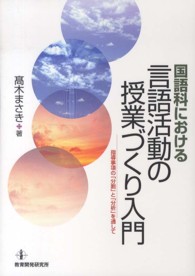Full Description
Expert contributors to this volume offer a comprehensive exploration of the UCP 600's impact on international trade finance law, examining the dynamic interplay between soft law and legal harmonization in 28 jurisdictions across all continents. With a rich array of case studies and insightful analysis, this book provides a nuanced interpretation of how soft law shapes global commerce. Its diverse perspectives and practical insights make it essential reading for practitioners and scholars seeking a deeper understanding of the real-world implications of soft law in trade.
Contents
List of Figure and Tables
PART 1: General Report
1 The Effectiveness of International Legal Harmonization through Soft Law (with a Focus on the UCP 600)
Agatha Brandão de Oliveira, Lauro Gama and Geneviève Saumier
1 Part I
1.1 Introduction
1.2 The Role of Soft Law in International Trade
1.3 An Overview of Letters of Credit and the UCP
1.4 The UCP as Soft Law
2 Part II
2.1 The UCP and How It May Apply to Govern Letters of Credit
3 Part III
3.1 The Future of the UCP as a Harmonizing Tool
Annex 1
Annex 2
Annex 3
PART 2: Special Report
2 Letters of Credit as Products of Transnational Customary Law: What Does That Mean?
J.H. Dalhuisen
1 Introduction
2 The Issue of Transnationalisation: the Modern Lex Mercatoria, Its Sources, and Their Hierarchy
3 The Modern Lex Mercatoria, Its Sources, and Their Hierarchy in Respect of the Letter of Credit
4 Practical Significance of the Transnational Approach
5 Law, Soft Law, and the Role and Function of an International Commercial Court
6 Conclusion
3 A Primer on Trade Finance and the UCP
Alexander R. Malaket
1 Context: International Trade and Financing
2 Trade Financing
2.1 Traditional Trade Finance and SCF
2.2 The Four Elements of Trade Finance
2.3 Transaction Flow, Rules and Market Practice
2.4 Documentary Letters of Credit
2.5 Balancing Rules, Guidance and Market Practice
3 Complementary Rulesets and Guides
4 icc and the ucp
4.1 Revisions of ucp
4.2 Harmonised Practice in Trade Finance
5 The Ucp: Harmonisation through Soft Law?
PART 3: National Reports
4 Argentina
Ariel G. Dasso
5 Australia
Sheelagh McCracken and Andrew Boxall
6 Austria
Andreas Schwartze
7 Belgium
Antoine De Spiegeleir
8 Brazil
Ligia Maura Costa
9 Canada
Michel Deschamps
10 China
Yanan Zhang
11 Czechia
Naděžda Rozehnalová and Jiří Valdhans
12 Egypt
Mohamed S. Abdel Wahab
13 Finland
Onerva-Aulikki Suhonen
14 France
Dominique Doise and Valérie Mayer
15 Germany
Olaf Meyer
16 India
Saloni Khanderia
17 Japan
Hiroo Sono
18 Mexico
Miguel Angel Bustamante
19 The Netherlands
Marta Pertegás Sender and Marielène Wertenbroek
20 Nigeria
Abubakri Yekini and Kolawole Mayomi
21 Norway
Berte-Elen Konow
22 Paraguay
Pablo A. Debuchy Boselli
23 Russia
Andrey Shirvindt
24 South Africa
Michelle Kelly-Louw and Wilhelm G Schulze
25 Sweden
Lars Gorton, Johan Adestam and Helen Ström Nilsonne
26 Switzerland
Renato Costantini
27 Turkey
Ceyda Süral Efeçınar, Ekin Ömeroğlu and N. Tuğçe Bilgetekin
28 United Kingdom
Anna-Mari Antoniou
29 Venezuela
Fernando Sanquírico Pittevil
30 Vietnam
Nguyen Thi Bich Ngoc
Index







